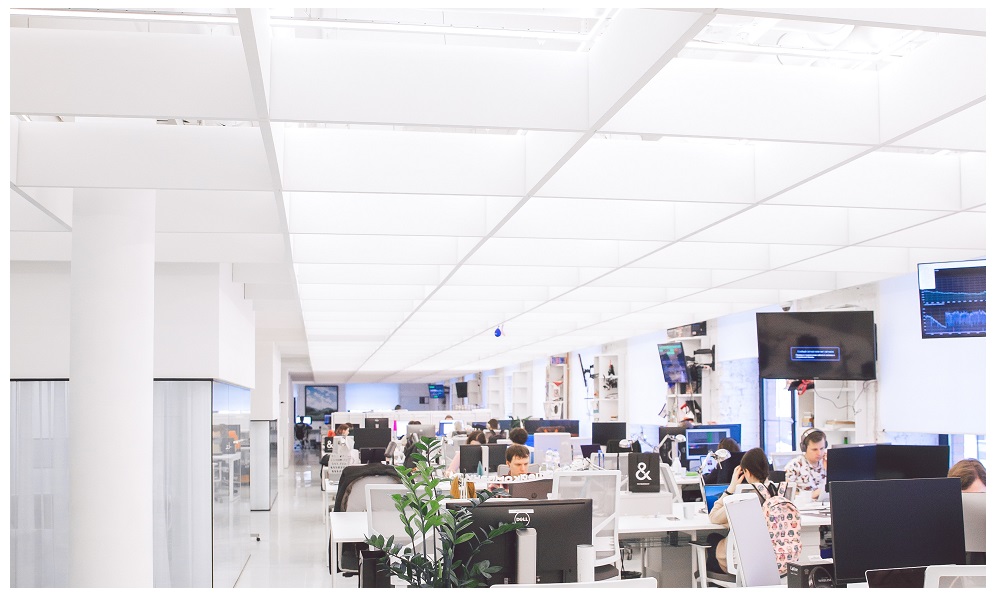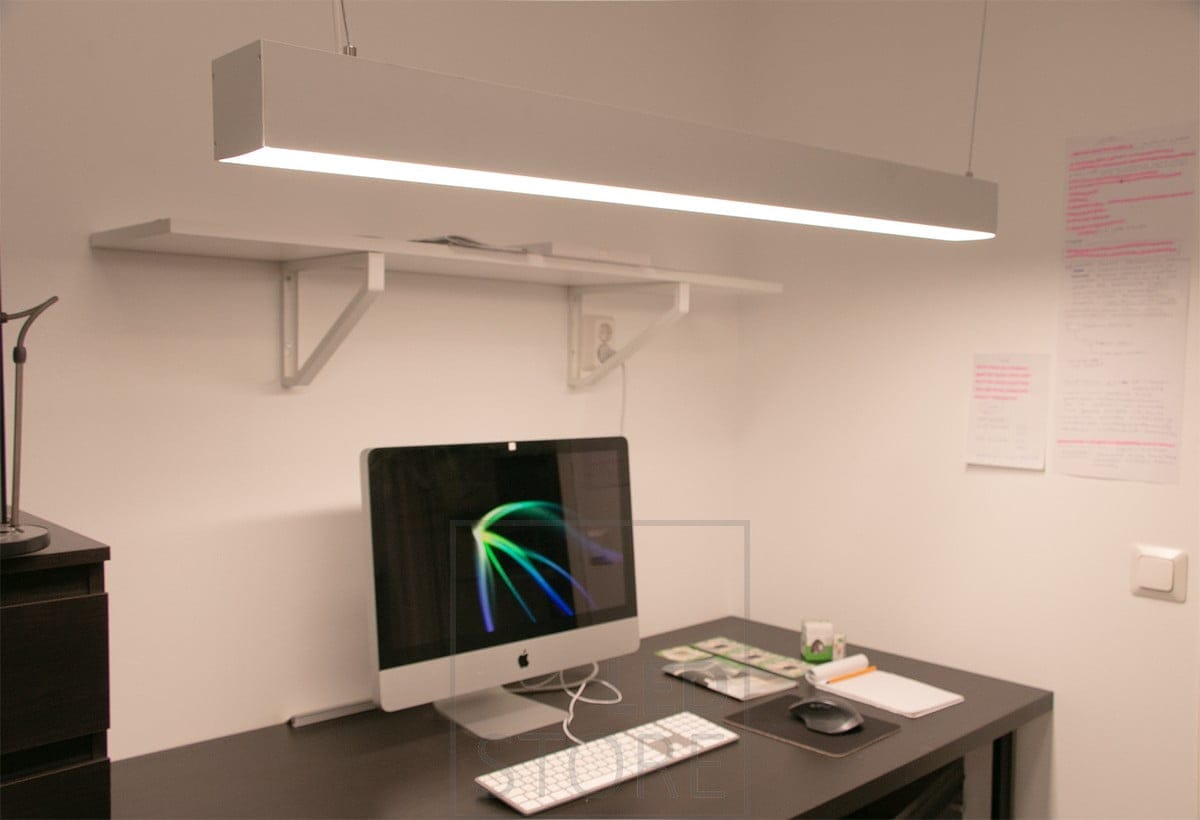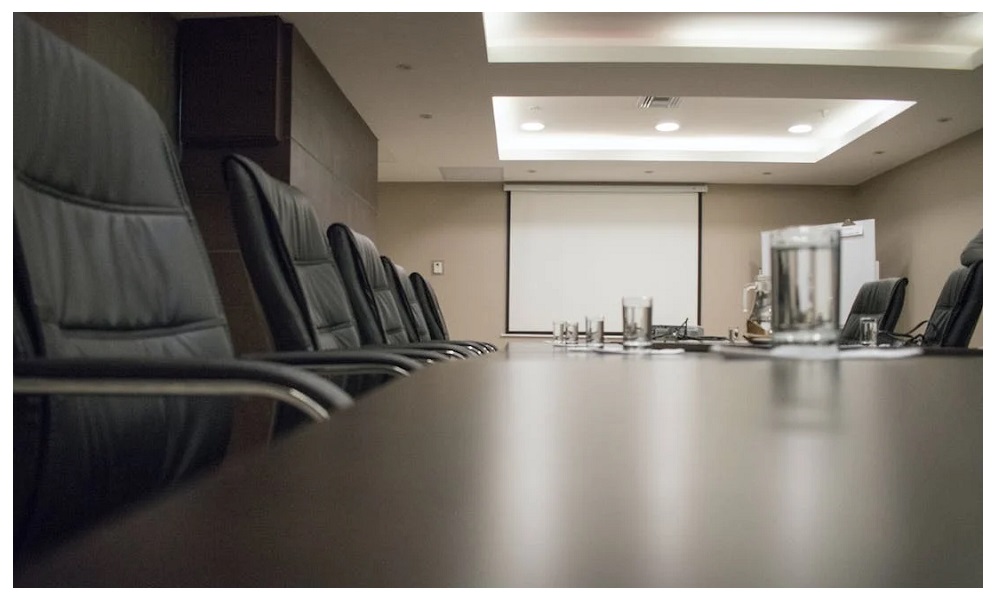Summarize
- Properly designed lighting improves work efficiency and concentration
- Natural daylight is most pleasant, but artificial light is important in winter
- General, mission
- and mood lighting to be combined effectively in the workplace
- Ergonomic lighting reduces eye strain and glare
- LED lights are energy-efficient and long-lasting lighting solutions
Let’s get started! In addition to ergonomics, office lighting has a number of effects on employee well-being, comfort and efficiency. Properly designed office lighting can increase work efficiency, reduce fatigue and improve concentration. In this article, we will look at how lighting design can help improve workplace comfort, which also has an impact on productivity. We provide concrete tips on how to optimise lighting.
Office lighting in practice
First, it is good to understand the basic principles of lighting. Natural daylight is the most pleasant for people, so wherever possible, workspaces should make use of it. In northern Finland, the long winter months make artificial lighting especially important. Good lighting design is built on the right mix of general, task, and ambient lighting.
Office general lighting
General lighting creates a uniform lighting level throughout the office. It allows workers to carry out basic tasks and is the main source of lighting in most workplaces. This type of lighting is usually created using LED fluorescent tubes or LED panels.
Many offices have a so-called cassette ceiling, consisting of 60cm*60cm variable sections. Such a ceiling makes it easy to install LED panels and other office technology. Office lighting with LED panels is excellent because the panels provide an efficient, even and almost glare-free light.

Task lighting
Task lighting focuses on specific work areas, such as desks, where employees need a stronger light source. Common solutions include desk lamps, adjustable spotlights, and pendant lights. Task lighting can also cover suspended fixtures installed above meeting tables. It is most often direct light, aimed precisely at the work surface.
Office mood lighting
With mood lighting, it’s possible to create a pleasant and inspiring atmosphere in the office. Office lighting isn’t usually associated with ambience, but we recommend giving it attention as well. The easiest spaces to introduce mood lighting are meeting rooms, corridors, and break areas, where lighting doesn’t need to meet strict task-lighting requirements and there’s more freedom to mix different types of fixtures.
The use of colour, contrast and direction of light can create a visually rich environment that supports employee wellbeing and creativity. For example, indirect lighting — such as upward-facing LED strips and wall lights — creates soft, atmospheric illumination. Indirect lighting also avoids harsh shadows.
Office lighting and lighting ergonomics
Ergonomics plays no small role in lighting design. Workers need adequate lighting levels that do not strain the eyes or cause glare. Light levels should be easily adjustable to suit different work tasks and individual preferences.
Office lighting and appropriate light colour temperature
We’ve written about how LED lights reduce eye strain and how lighting can contribute to overall eye health. Of the light colour temperatures, 4000K is pure white and requires the least adaptation from the eyes, i.e. causes the least eye strain. This is why office lighting is most often implemented at 4000K.
However, not everyone finds pure white light comfortable. If there are several separate office spaces in a workplace, some may choose a warmer light shade. We do not recommend combining lights of different shades in the same space, as the result will not look harmonious. LedSore’s LED panels can be combined with a stepless light colour temperature control, so that the light shade can be selected according to the situation.

The effect of the colour rendering index
When planning office lighting, it’s important to also consider the quality of light produced by the fixtures. For office use, we recommend luminaires with a color rendering index (CRI) above 90. The higher the CRI, the less strain on the eyes. With low-CRI products, some shades of light may not be accurately reproduced, forcing the eyes to work harder.
Office lighting in different spaces
Office lighting design should take into account the different work spaces and their typical lighting needs. In general, office spaces should focus on efficient, high-quality and adaptable lighting. We also discuss the different lighting needs and possibilities for different spaces.
Office lighting at workstations
The actual workplace can be a landscape office, a private office room, or located in a shared, larger office. Depending on the work tasks, we recommend that employees should be able to adjust the office lighting to their own preferences.
The height of a workstation directly impacts the position of the monitor and potential screen reflections. This becomes especially important with height-adjustable desks used for both sitting and standing. Beyond light output and glare, it’s also worth considering whether a pendant fixture is the best option for such setups. For workstations, it’s generally better to choose lighting that distributes light evenly from a flat surface, reducing screen reflections and ensuring consistent illumination regardless of desk height adjustments.
If you want to use spotlights, be careful with their placement. When wearing spectacles, a spotlight mounted directly overhead will cause a reflection on the spectacles. We recommend that spotlights are positioned from the centre line of the workstation towards the wall. Spotlights facing the wall reduce the contrast between the display terminal and the wall and thus reduce eye strain. Back wall lighting can also be achieved with wall-mounted fixtures or LED strips.

Office lighting in meeting rooms
The lighting in meeting rooms should be flexible to suit both casual meetings and formal presentations. Lighting should include general lighting, indirect lighting and mood lighting. Different types of lighting options should be grouped behind different buttons so that they can be used at different times. In addition to this, we recommend investing in adjustability, i.e. we recommend lights that are both dimmable and adjustable for light colour temperature.
The lighting in meeting rooms should also take into account any technology, such as video projectors and screens that drop from the ceiling.

Office lighting – staff break rooms
In employee break rooms, it is a good idea to invest in comfortable and relaxing lighting that promotes employee recovery and a sense of community. Break rooms should not be lit as brightly as work areas, so that the difference in light levels also indicates that a break is in progress. Why not have the courage to install additional RGB lighting for possible company parties!
Office lighting and energy efficiency
Energy efficiency is an important aspect of lighting design, especially in Finland where electricity consumption is high. Energy-efficient lights, such as LED lights, reduce electricity consumption and lower the company’s carbon footprint. Energy savings can be a significant financial benefit for a company.
Office lighting or upgrading it may seem like a complicated project, but it’s an investment that pays for itself. It improves well-being and productivity, and saves electricity too! We recommend turning to professionals to help you assess your lighting needs. Let’s create a functional and comfortable office lighting system together!
What are the benefits of LED lighting for office lighting?
LED lighting has grown rapidly in recent years and offers many advantages over traditional light sources. Here are a few important advantages that LED lighting offers for office lighting:
- Energy efficiency: LED lights consume less energy than conventional light sources, which means they save energy and reduce electricity bills. This makes LED lighting a very attractive option for businesses and households looking to save on energy costs.
- Lifetime: LED lights last much longer than conventional light sources. This means that LED lights do not need to be replaced as often, saving money and reducing the environmental impact.
- Low heat output: LE lights produce less heat than conventional light sources. This makes LED lighting a safer option, as they do not pose the same fire risk as traditional light sources. Low heat input also increases energy efficiency in spaces that are mechanically cooled.
- Colour temperature adjustment: the colour temperature of the LED lights can be adjusted as required. This means that LED lights can be used in a wide range of situations and spaces.
- Fast start-up: the LED lights come on immediately and without delay. This makes them practical in situations where fast and efficient lighting is needed.
In addition to these benefits, LED lighting also offers many other advantages, such as environmental friendliness and versatility. LED light is an excellent choice for those who want to save energy, money and the environment while enjoying high quality and efficient light in the workplace.
Lastly
In summary, office lighting is worth careful planning, as it affects many other things besides comfort. Carefully considered office lighting can increase work efficiency, reduce fatigue and improve the comfort of the working environment. By taking into account the combination of different lighting modes, ergonomics, specific workplace requirements and energy efficiency, it is possible to create a workplace where employees feel comfortable and achieve the best possible work performance.
LED lighting expert
LedStore has been a specialist in LED lighting since 2010. We have our own product design, so our products are technologically state-of-the-art.
Our focus is on light colour temperature controlled and high colour rendering index lights. We do around 500 lighting designs in a year.
We offer custom-made LED strips, i.e. custom-made LED strips in a suitable aluminium profile. If you live in the capital region , we can also install the LED strips and lighting for you .
Remember that we are always ready to offer our help to you along the way, by email (myynti@ledstore.fi) and by phone (045 251 4510). As always, feel free to share photos of your own projects on social media at #ledstorefi IG and @ledstorefinland FB. We love to see how cool things are made with our lights. Sharing photos provides inspiration for those who aren’t sure how to implement beautiful LED lighting. Did you know that we already have over 3500 pictures of installations with our lights in our Gallery?
Gallery of LED lights:
Product gallery: Pictures of PRODUCTS in different installation locations
Indirect light: Indirect light in different spaces
Room-specific: Light in different rooms
References: Complete houses that have been photographed



